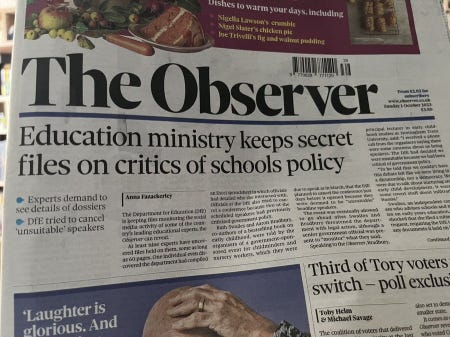Did the DfE blacklist speakers for criticising government policy? Part 1
Another Freedom of Information request casts light on The Observer's recent paranoid stories about the DfE
Is any education news published in The Observer true?
You may remember that I wrote three blog posts about The Observer’s assertions that the DfE was keeping files on critics of DfE policy.
Blog Series: Is the DfE keeping files on “education experts” who criticise their policies?
In case you don’t have time to read three old blog posts, here’s a summary:
The Observer alleged that “secret files” were being kept on critics of DfE policy. Originally, The Observer reported there were at least nine individuals affected; later they talked about dozens. This was all based on Subject Access Requests made by the “monitored” individuals. Some of the stories were based on claims that attempts had been made to cancel speakers at education conferences. I did not say much about that part of the story. However, the “keeping files” claim was more dubious. If you make a Subject Access Request, civil servants will search for all the times you have been mentioned in emails, correspondence, or other written materials, and compile a file. To subsequently complain that they have “kept a file” on you, is ridiculous. My blog posts showed considerable evidence that this was what had happened: people who had asked for files to be compiled on themselves, were then upset that those files existed. It might be possible for them to object to being mentioned in the compiled material in the first place, however, the fairness of that complaint would then hinge on why they were being discussed.
But what about those conference speakers?
I did not address the part of the story about speakers at education conferences. There seemed to be good evidence that some efforts had been made to cancel or censor speakers who had already been booked, and that is something that I consider unfair. Previously, I had complained about a non-DfE-related example of a speaker being cancelled (in the second item in this blog post). It was also the case that there had been earlier stories about speakers being cancelled from government events for criticising the government.
I am concerned that a policy about speakers could be applied heavy-handedly or unfairly. However, it is not unreasonable for government departments to avoid providing a platform for people to oppose government policy. It would be particularly perverse if the DfE was organising and funding a conference to share best practice, only for the speakers at the conference to make recommendations completely at odds with the practices the conference was intended to share. Not all conferences are there to hold debates or argue over policy. Some are there as part of the process of disseminating and implementing policy. Apart from the issue of cancelling people after they have been booked, it all comes down to whether the rules governing speakers are reasonable and fair.
So what are the DfE’s rules about speakers at education conferences?
A recent Freedom of Information response has provided more evidence about the DfE’s policy regarding speakers. The DfE was asked:
Could you please let me know how many speakers you have rejected/blacklisted from DfE events for criticism of the Government/Government policy. Please note I am not requesting the names of those rejected.
This article (a follow up on the one previously mentioned) provides further details on the guidance given to the workers conducting these checks -
https://www.theguardian.com/politics/202...
The reply from the DfE uses the issue of cost to avoid attempting to search for this information. This is then explained in more detail.
However, the Department is clear that it does not have a policy of monitoring the social media accounts of individuals, nor does the department have a policy of rejecting/ blacklisting speakers from DfE events for criticism of the Government/ Government policy. We therefore do not hold a central record of such information. I have considered ways in which your request might be narrowed or limited in order to reduce the cost of complying with it. However, due to the nature of your request – it would involve responses from every member of departmental staff - I do not consider that the Department would be able to provide the information you have requested without exceeding the cost limit.
This undermines The Observer’s story. And whilst a true conspiracy theorist might doubt the DfE’s word, it must be remembered that the entire story was based on information released from the DfE. It is unlikely that the DfE would be lying if it had already released evidence to the contrary that was now in the hands of journalists and lawyers.
Well, that’s all settled then… or is it?
The original, fully paranoid version of The Observer’s story with its talk of blacklists and comparisons with dictatorships is no longer credible. However, what was going on with the vetting of speakers, the last-minute discussion of cancellations, and the apparent efforts at censorship?
I will return to this in Part 2.




